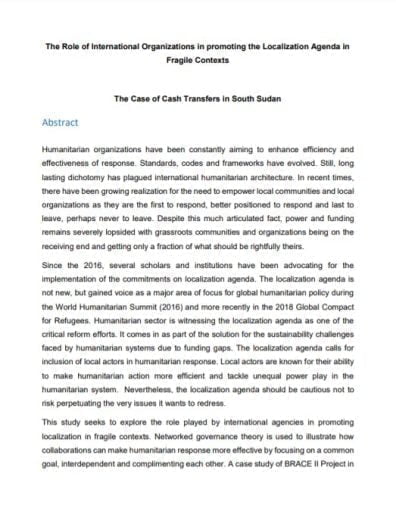Role of International Organisations in promoting localisation agenda: case study of social protection in South Sudan
Humanitarian organizations have been constantly aiming to enhance efficiency and effectiveness of response. Standards, codes and frameworks have evolved. Still, long lasting dichotomy has plagued international humanitarian architecture. In recent times, there have been growing realization for the need to empower local communities and local
organizations as they are the first to respond, better positioned to respond and last to leave, perhaps never to leave. Despite this much articulated fact, power and funding remains severely lopsided with grassroots communities and organizations being on the receiving end and getting only a fraction of what should be rightfully theirs.
Since the 2016, several scholars and institutions have been advocating for the implementation of the commitments on localization agenda. The localization agenda is not new, but gained voice as a major area of focus for global humanitarian policy during the World Humanitarian Summit (2016) and more recently in the 2018 Global Compact for Refugees. Humanitarian sector is witnessing the localization agenda as one of the
critical reform efforts. It comes in as part of the solution for the sustainability challenges faced by humanitarian systems due to funding gaps. The localization agenda calls for inclusion of local actors in humanitarian response. Local actors are known for their ability
to make humanitarian action more efficient and tackle unequal power play in the humanitarian system. Nevertheless, the localization agenda should be cautious not to risk perpetuating the very issues it wants to redress.
This study explored the role played by international agencies in promoting
localization in fragile contexts. Networked governance theory was used to illustrate how collaborations can make humanitarian response more effective by focusing on a common goal, interdependent and complimenting each other. A case study of BRACE II Project in
South Sudan illustrated how three dimensions of localization are implemented in Social protection and how international organizations support or limit this.



